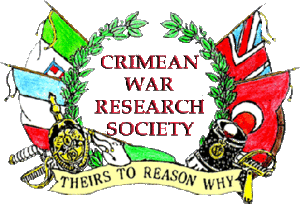Crimean War Research Society facts for kids
The Crimean War Research Society (CWRS) is a group of people from all over the world who love history. They are both professional historians and history fans. Their main goal is to study the Crimean War, which happened from 1854 to 1856. The Society wants to share new or less-known information about this war with more people. They also make sure this information is available for historians today and in the future. The CWRS publishes a magazine four times a year called The War Correspondent.
Contents
History of the Society
The Crimean War Research Society started in London in 1983. Many of its first members were also part of the Victorian Military Society (VMS). However, they felt that the VMS and its magazine did not focus enough on the Crimean War. So, they decided to create their own group just for studying this war.
The first leaders of the Society included Glenn Christodoulou, who was Chairman from 1983 to 1995. David Cliff was the Secretary starting in 1983, and Frank Hippman handled publications. David Cliff was also the first editor of the Society's magazine, The War Correspondent. Later editors included Rod Robinson, Major Colin Robins OBE, author Lawrence W. Crider, and publisher Matthew J. Pizzo. Lawrence W. Crider became the editor again in 2014 and continues in that role.
In 2014, the Society's magazine, The War Correspondent, paused publication for seven months. This break ended in December 2014 when a new issue came out. During this time, the CWRS made some changes to how it was organized. For example, it decided to stop being a charity, which it had been for a few years.
What the Society Does
The Crimean War Research Society has several important goals. They want to honor and remember the soldiers who died in the war. They also study the entire war, from big topics to small details.
Exploring War Topics
The Society looks into many different parts of the Crimean War. This includes:
- Why so many soldiers died from disease in the Crimea.
- Naval battles in the Baltic Sea.
- Less-known facts, like the British Army not using poison gas at Sevastopol.
- Naval actions in the Pacific Ocean.
They also study famous events and people, such as:
- The Battle of Alma.
- The Charge of the Light Brigade.
- The Battle of Inkerman, also known as "the Soldier's Battle."
- The work of Florence Nightingale, a famous nurse.
- The Fall of Sevastopol.
- Mistakes made by military leaders.
- The amazing strength of ordinary soldiers.
- The Great Storm that hit the Crimea.
- Political arguments in cities like Constantinople, Vienna, Paris, and London.
- How newspapers reported the war and the use of the new telegraph.
- The uniforms and weapons used.
- The lives of soldiers, sailors, camp-followers, and even people watching the war.
- How the war affected the military, businesses, and everyday people.
Sharing Research and Knowledge
The Society's magazine, The War Correspondent, shares the latest research from its members. Many of these members are professional historians. Each year, the Society gives out the Canon Lummis Trophy for the most original article in its magazine.
The CWRS also gives expert advice for projects about the Crimean War. These projects include academic studies and mass media productions. For example, they helped with Channel Four's 1997 TV show called The Crimean War. They also advise on books and other magazines.
Conferences and Visits
The Society holds a three-day conference every year. At this event, members give presentations and share new research about the Crimean War. They also organize research and study trips both in their home countries and internationally. These trips have included visits to the Crimea to see the actual battlefields and memorials from the war.
Publications and Resources
The Society publishes many different materials for people researching the war. These include:
- Copies of old maps and books from the time of the war.
- Information sheets about what is in regimental museums.
- Lists of books and articles on the war (bibliographies).
- Records of who received medals.
- Other books and booklets written by the Society's members.
Well-Known Members
- Norman Rossington, an actor
- George Paget, 7th Marquess of Anglesey
 | Kyle Baker |
 | Joseph Yoakum |
 | Laura Wheeler Waring |
 | Henry Ossawa Tanner |


